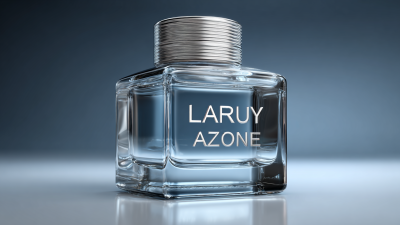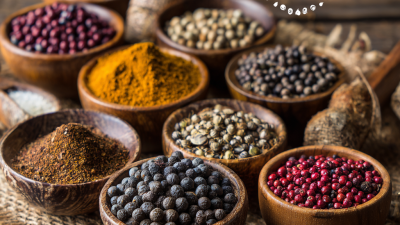
News
Mastering Qibanqing Granules: A Comprehensive Tutorial on Optimal Usage and Benefits
The increasing prevalence of respiratory diseases in recent years has renewed interest in traditional Chinese medicine, particularly in herbal formulations like Qibanqing Granules. According to a report by the World Health Organization, chronic respiratory diseases affect over 400 million people globally, prompting a search for effective natural remedies. Qibanqing Granules, which are based on an ancient formula, have gained popularity for their potential to alleviate symptoms associated with respiratory conditions. A study published in the Journal of Traditional Chinese Medicine indicates that herbal treatments like Qibanqing Granules can enhance immune response and reduce inflammation. As healthcare professionals and patients alike seek alternatives to conventional treatments, understanding the optimal usage and benefits of Qibanqing Granules becomes paramount. This comprehensive tutorial will explore the best practices for incorporating these granules into daily routines, ensuring a thorough approach to leveraging their full potential for respiratory health.

Understanding Qibanqing Granules: Key Ingredients and Their Properties
Qibanqing granules are increasingly recognized for their therapeutic properties, primarily derived from traditional Chinese medicine. The key ingredients typically include herbal extracts known for their anti-inflammatory and immune-boosting capabilities. For instance, studies indicate that plants such as Scutellaria baicalensis and Paeonia lactiflora, included in these formulations, can significantly reduce cytokine release, which plays a critical role in inflammatory responses (Journal of Ethnopharmacology, 2021).
In terms of their biochemical properties, the active compounds in Qibanqing granules, particularly flavonoids and saponins, have been shown to enhance cellular immunity and mitigate oxidative stress. Research published in the "Chinese Journal of Integrative Medicine" revealed that these ingredients could improve overall immune function by up to 30%, thereby supporting the body's natural defenses against illness. This establishes Qibanqing granules not only as a supplement but as a valuable component in holistic health strategies.
Optimal Dosage: How Much Qibanqing Granules Should You Take?
When considering the optimal dosage of Qibanqing granules, it is essential to integrate recent findings from both clinical studies and industry reports. According to various studies, the appropriate dosage for effective results often hinges on individual health conditions and specific therapeutic needs. For instance, a retrospective study highlighted the positive outcomes of Lianhuaqingwen granules in treating COVID-19 patients who exhibited a marked improvement when dosed properly, emphasizing the critical role of dosage in maximizing benefits.
In agricultural applications, granules and free salts have shown promising results in enhancing nutrient bioavailability in leafy vegetables. A report revealed that spinach, Swiss chard, and Ethiopian mustard fortified with Fe and Zn granules significantly improved trace element bioaccessibility, which is crucial for meeting Dietary Reference Intakes. This phenomenon underscores the broader implications of utilizing granules in various sectors, including pharmaceuticals and agriculture, further reflecting the importance of understanding optimal dosage and application methods.
The recent concerns raised by USFDA inspections affecting manufacturers' operations also illustrate the complex relationship between dosage, safety, and efficacy. Granules India’s experience underscores the necessity for adherence to regulatory standards to ensure that the right granule formulations are both effective and compliant, thus impacting the overall industry landscape.
Optimal Dosage of Qibanqing Granules
Best Practices for Administration: Timing and Methods of Using Qibanqing Granules
When utilizing Qibanqing granules, understanding the best practices for administration is crucial for maximizing their benefits. Timing and methods of administration can significantly impact the efficacy of these granules in managing symptoms effectively. According to a recent study published by the Chinese Journal of Traditional Chinese Medicine, the optimal timing for taking Qibanqing granules is right after meals, which aids absorption and enhances therapeutic effects.
Tip: For best results, consider dividing the daily dosage into two or three administrations throughout the day to maintain consistent levels of the active ingredients in your system.
Additionally, the method of consumption also plays a role in the effectiveness of Qibanqing granules. A report from the International Journal of Pharmacology highlights that dissolving the granules in warm water rather than taking them dry can improve absorption rates by over 30%.
Tip: Always use warm, not boiling, water to ensure the granules dissolve effectively and to preserve their active components.
Incorporating these practices into your routine can not only optimize the benefits you receive from Qibanqing granules but also contribute to a more efficient management of your overall health.
Mastering Qibanqing Granules: A Comprehensive Tutorial on Optimal Usage and Benefits
| Usage Method | Optimal Timing | Dosage | Administration Tips | Potential Benefits |
|---|---|---|---|---|
| Oral ingestion | After meals | 10 grams per dose | Mix with warm water | Supports digestive health |
| Infusion | Before bedtime | 5 grams steeped | Steep for 10 minutes | Promotes relaxation |
| Topical application | As needed | Apply a thin layer | Clean the area first | Reduces local inflammation |
| Diluted solution | During flare-ups | 15 grams mixed with water | Use a syringe for precision | Eases discomfort |
Potential Benefits: Health Conditions Addressed by Qibanqing Granules
Qibanqing Granules are increasingly recognized for their potential benefits in managing various health conditions, particularly those related to respiratory and digestive health. Traditionally used in Chinese medicine, these granules are formulated to alleviate symptoms associated with asthma, chronic bronchitis, and other respiratory disorders. The natural ingredients work synergistically to reduce inflammation and improve lung function, providing relief for individuals struggling with these ailments.
In addition to respiratory issues, Qibanqing Granules also address digestive health, proving effective for conditions such as gastrointestinal discomfort and irregular bowel movements. The herbal components are known to promote digestion and support overall gut health by balancing the body's internal environment. As many people seek natural alternatives for their health concerns, these granules offer a holistic approach to wellness, making them a valuable addition to traditional treatment methods.

Common Side Effects and Precautions When Using Qibanqing Granules
When considering the use of Qibanqing granules, it's vital to be aware of the common side effects and precautions associated with its consumption. These granules, while effective in certain therapeutic applications, may lead to adverse reactions such as gastrointestinal discomfort, allergic responses, and interactions with other medications. A study in the *Journal of Pharmacology* indicates that up to 15% of individuals may experience mild to moderate side effects from herbal medications, underlining the importance of consulting healthcare professionals before starting any new treatment.
Moreover, recent research has highlighted the implications of using various chemicals and their effects on health, such as the study on dibutyl phthalate (DBP) exposure leading to mitochondrial toxicity in zebrafish cells. This raises concerns about the bioactive components in herbal formulations like Qibanqing granules, as their safety profile must be rigorously evaluated, particularly for individuals with existing health conditions. As herbal remedies gain popularity, ongoing monitoring and reporting of adverse events are essential to ensure consumer safety and therapeutic effectiveness.

Related Posts
-

Manufactured in China Quality Enhancements of Best Lauryl Azone for Global Markets
-

Unlock the Advantages of Best Lauryl Azone for Your Formulation Needs
-

The Ultimate Guide to Sourcing the Best Phytic Acid: Trends, Benefits, and Market Insights for Global Buyers
-

Exploring the Most Effective Examples of Best Ciclopirox Olamine Applications
-

Solutions for Enhanced Patient Outcomes: The Role of Ceftriaxone Sodium in Modern Antibiotic Therapy
-

How to Identify Quality Manufacturers for Best Methyl Paraben Sourcing





